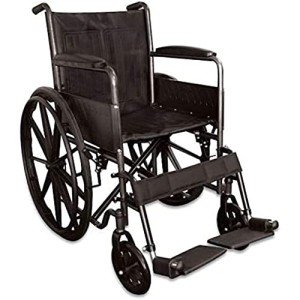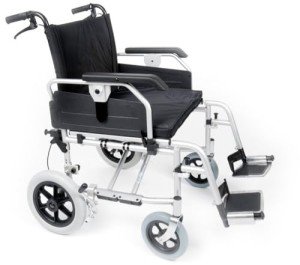Bariatric Transport Wheelchair
 Developed to be pressed by caregivers, transport chairs feature smaller sized front wheels and bigger rear wheels. They are a popular option for users with minimal mobility who can not stroll individually.
Developed to be pressed by caregivers, transport chairs feature smaller sized front wheels and bigger rear wheels. They are a popular option for users with minimal mobility who can not stroll individually.
When shopping for a lightweight bariatric transport wheelchair (trade-britanica.trade), think about the user's needs and how they'll use the chair. Likewise, measure any entrances and other spaces the chair will travel through.
Seating
bariatric wheelchair weight limit transport chairs feature a large 22 to 36 inch wide seating area that accommodates extra-large users. The chair seat is made from breathable nylon and comes with cushioned arms that can be eliminated and swing-away footrests. Unlike basic wheelchairs, which are ideal for average body weights, bariatric chairs have actually heavier frames built from strengthened materials and larger rear wheels that make it easier to press them. Speak to a mobility specialist to get more information about your options and to determine which kind of wheelchair is ideal for you. Bariatric wheelchairs are frequently covered by insurance coverage companies like Medi-Cal if your medical condition satisfies their coverage requirements.
Frame
Bariatric transport wheelchairs use durable frames made of enhanced materials like steel and have larger seats than basic wheelchairs. They are created for people with greater body weights and can hold an optimum weight capacity of 700 pounds. They also have larger rear wheels, that make them easier for caretakers to push. Bariatric wheelchairs are typically covered by insurance coverage such as Medi-Cal, depending upon the client's particular medical needs and diagnosis. Ask a health care expert or mobility professional to assist choose the best chair for your distinct requirements.
Click on this link for more details. Medline Bariatric Transport Chair. Deep Red Hammertone Frame.
Weight
While standard wheelchairs have lighter frames and smaller wheels, bariatric transport chairs include heavier-duty products and a broader seat to accommodate users who weigh more than average. Due to the fact that of their specialized style and building and construction, they tend to cost more than basic chairs. Nevertheless, some insurance coverage programs like Medicare and Medi-Cal may cover the expense of these chairs if the user satisfies the requirements for protection. To find out more about which chair is right for you, call a rehabilitation professional today.
Wheels
bariatric wheelchair weight limit transport wheelchairs have larger rear wheels than standard models, making them easier to push. They're often utilized in medical facilities and home settings, where the chair is pressed by caretakers. The extra-large rear wheels also allow the chairs to navigate a range of terrain, including outdoors.
Basic wheelchairs usually have smaller wheels, which make them more maneuverable indoors but less appropriate for daily use on outdoor streets and other surface areas. Mobility specialists advise seeking advice from a health care provider or mobility professional to select the finest wheelchair for your specific requirements and objectives.
 This heavy duty bariatric wheelchair-duty, nylon enhanced steel transport chair supports clients up to 500 pounds and includes a large 22" seat, padded desk-length armrests, swing-away footrests and hand brakes. The 12-inch rear wheels make sure a smooth ride in any environment.
This heavy duty bariatric wheelchair-duty, nylon enhanced steel transport chair supports clients up to 500 pounds and includes a large 22" seat, padded desk-length armrests, swing-away footrests and hand brakes. The 12-inch rear wheels make sure a smooth ride in any environment.
 Developed to be pressed by caregivers, transport chairs feature smaller sized front wheels and bigger rear wheels. They are a popular option for users with minimal mobility who can not stroll individually.
Developed to be pressed by caregivers, transport chairs feature smaller sized front wheels and bigger rear wheels. They are a popular option for users with minimal mobility who can not stroll individually.When shopping for a lightweight bariatric transport wheelchair (trade-britanica.trade), think about the user's needs and how they'll use the chair. Likewise, measure any entrances and other spaces the chair will travel through.
Seating
bariatric wheelchair weight limit transport chairs feature a large 22 to 36 inch wide seating area that accommodates extra-large users. The chair seat is made from breathable nylon and comes with cushioned arms that can be eliminated and swing-away footrests. Unlike basic wheelchairs, which are ideal for average body weights, bariatric chairs have actually heavier frames built from strengthened materials and larger rear wheels that make it easier to press them. Speak to a mobility specialist to get more information about your options and to determine which kind of wheelchair is ideal for you. Bariatric wheelchairs are frequently covered by insurance coverage companies like Medi-Cal if your medical condition satisfies their coverage requirements.
Frame
Bariatric transport wheelchairs use durable frames made of enhanced materials like steel and have larger seats than basic wheelchairs. They are created for people with greater body weights and can hold an optimum weight capacity of 700 pounds. They also have larger rear wheels, that make them easier for caretakers to push. Bariatric wheelchairs are typically covered by insurance coverage such as Medi-Cal, depending upon the client's particular medical needs and diagnosis. Ask a health care expert or mobility professional to assist choose the best chair for your distinct requirements.
Click on this link for more details. Medline Bariatric Transport Chair. Deep Red Hammertone Frame.
Weight
While standard wheelchairs have lighter frames and smaller wheels, bariatric transport chairs include heavier-duty products and a broader seat to accommodate users who weigh more than average. Due to the fact that of their specialized style and building and construction, they tend to cost more than basic chairs. Nevertheless, some insurance coverage programs like Medicare and Medi-Cal may cover the expense of these chairs if the user satisfies the requirements for protection. To find out more about which chair is right for you, call a rehabilitation professional today.
Wheels
bariatric wheelchair weight limit transport wheelchairs have larger rear wheels than standard models, making them easier to push. They're often utilized in medical facilities and home settings, where the chair is pressed by caretakers. The extra-large rear wheels also allow the chairs to navigate a range of terrain, including outdoors.
Basic wheelchairs usually have smaller wheels, which make them more maneuverable indoors but less appropriate for daily use on outdoor streets and other surface areas. Mobility specialists advise seeking advice from a health care provider or mobility professional to select the finest wheelchair for your specific requirements and objectives.
 This heavy duty bariatric wheelchair-duty, nylon enhanced steel transport chair supports clients up to 500 pounds and includes a large 22" seat, padded desk-length armrests, swing-away footrests and hand brakes. The 12-inch rear wheels make sure a smooth ride in any environment.
This heavy duty bariatric wheelchair-duty, nylon enhanced steel transport chair supports clients up to 500 pounds and includes a large 22" seat, padded desk-length armrests, swing-away footrests and hand brakes. The 12-inch rear wheels make sure a smooth ride in any environment.